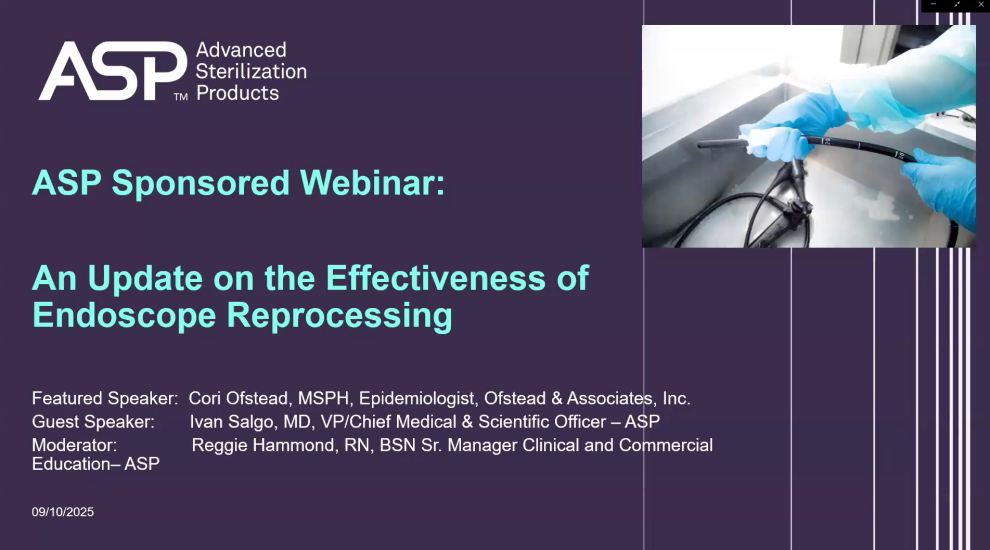An Evidence-Based Discussion of the Problems and Possible Solutions
Flexible endoscopes, due to their complex design and exposure to biological materials during procedures, are challenging to reprocess effectively. They are heavily exposed to blood, mucus, and other secretions during procedures and may harbor billions of microbes before processing. Guidelines recommend thorough cleaning and high-level disinfection (HLD) or sterilization after each use. While HLD is intended to eliminate most pathogens, Ofstead’s review of real-world evidence from 2019 to 2024 found that HLD often failed to eradicate all microbes, leaving patients at risk of infection.*
This webinar summarizes key evidence and underscores the urgent need for sterile processing professionals, infection preventionists, clinicians, and healthcare leaders to reevaluate and strengthen their endoscope reprocessing protocols to mitigate infection risks.
An Update on the Effectiveness of Endoscope Reprocessing
Speaker: Cori Ofstead
By the end of this webinar, you will be able to:
- Describe at least three examples of infections linked to inadequate endoscope processing.
- Discuss factors that impact the effectiveness of high-level disinfection for processing endoscopes.
- Explain guidelines for visual inspection and the evidence supporting the use of borescopes and lighted magnification.
Meet the Speakers

Cori Ofstead , MSPH, President and CEO Ofstead & Associates
Cori L. Ofstead, MSPH is an Epidemiologist with 30 years of experience in real-world research on infection prevention and device processing. Her studies have been published in PROCESS, AJIC, CHEST, Endoscopy International Open, Journal of Urology, AORN Journal, and AAMI's BI&T. She is a reviewer of several peer reviewed journals and is on AJIC's editorial board.
Cori is a leading device processing and infection control educator and highly regarded speaker at local, national, and international conferences, including APIC, ID Week, CDC's immunization summit and international conference on emerging infectious diseases, ANSI/AAMI, AORN, HSPA, SGNA, ASGE, AGA, and FDA. She has also developed and taught numerous continuing education sessions. She is an active AAMI Workgroup 84 voting member who contributed to ST91 and TIR99.

Ivan S. Salgo M.D., M.S., M.B.A. , Vice President, Chief Medical and Scientific Officer, ASP
Ivan S. Salgo, M.D., M.S., M.B.A. is Vice President, Chief Medical and Scientific Officer at Advanced Sterilization Products (ASP). He is responsible for organizing, generating, and communicating evidence on the processes of Sterilization and Disinfection. He is keenly interested in providing a holistic picture on fortifying the need understanding and preventing Hospital Associated Infection and elevating the standard of care. His clinical experience as a cardiac anesthesiologist and intensivist includes managing surgical intensive care and healthcare associated infection.
Dr. Salgo has been involved in Healthcare Analytics in assessing patient deterioration using multiple digital biomarkers. He has been co-investigator of an NIH Biomedical Research Partnership on cardiac surgical image guided intervention and Pediatric Aortic Valve Repair with Boston Children’s Hospital/Harvard Medical School. Dr. Salgo was director of the Intraoperative Echocardiography Program and was on the Anesthesia Faculty of the University of Pennsylvania.
Ivan received his B.S. and M.S. degrees in Chemical Engineering from Columbia University. He received his M.D. degree with Distinction in Research from the Mount Sinai School of Medicine in New York City. He did his residency and fellowship at the University of Pennsylvania in Cardiothoracic Anesthesiology where he later joined the faculty. He also received his M.B.A. degree from the Massachusetts Institute of Technology Sloan School of Management in 2012.
Acknowledgements
ASP is committed to the ethical collaboration and interaction with Healthcare Professionals. Under the Open Payments Act, also known as the Sunshine Act, ASP is required to report payments or transfers of value for expenses associated with this event, if applicable.
*“Endoscope processing effectiveness: A reality check and call to action for infection preventionists and clinicians.” American Journal of Infection Control (AJIC), 2025.



